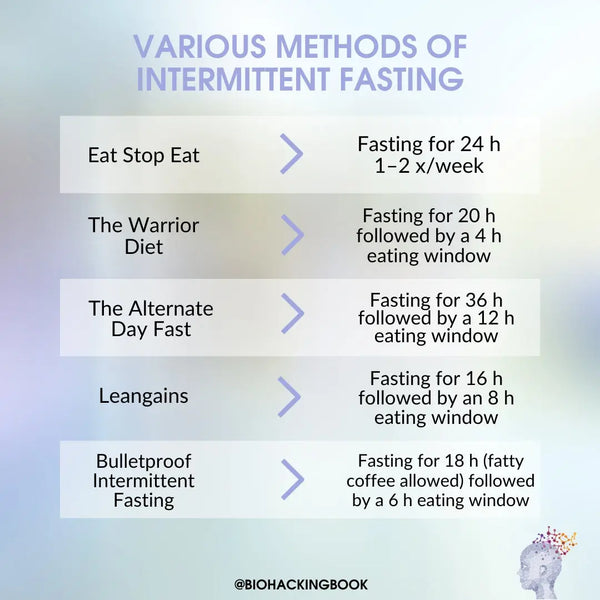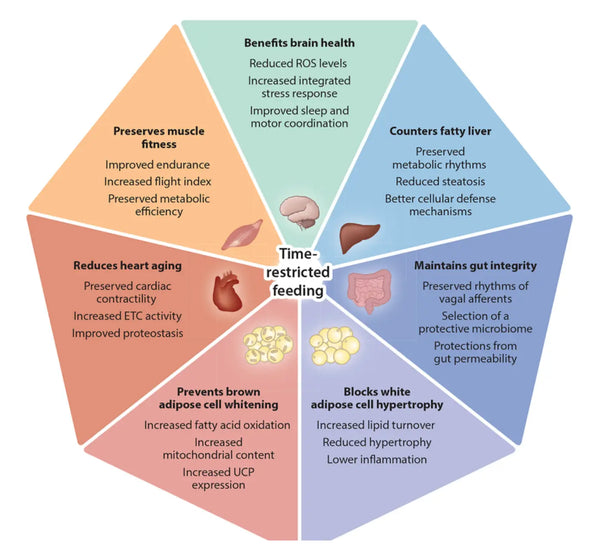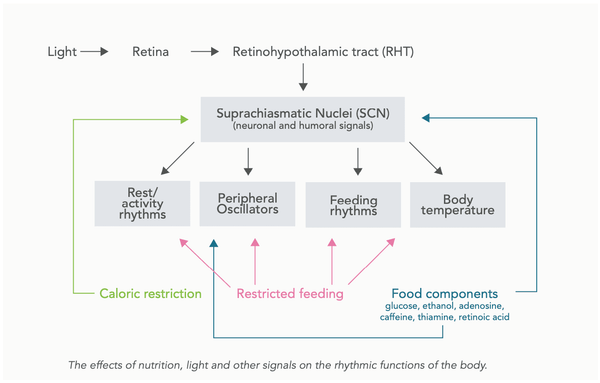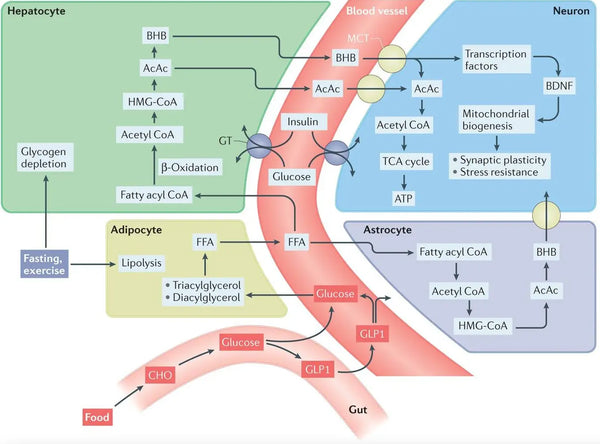Intermittent fasting (IF) means fasting for a significant portion of the day (for example, 16 hours) and eating your daily food during the remaining window (for example, 8 hours). Intermittent fasting is closely related to time-restricted eating/feeding (TRF), where the main focus is shortening the daily eating window. In intermittent fasting, the focus is on fasting and its associated health effects, such as increased fat burn, keto-adaptation and autophagy. Intermittent fasting often includes cutting daily calories, whereas time-restricted feeding does not. Currently, however, these two terms are often used synonymously.
The time of day when food is eaten affects body weight and composition, glucose and fat metabolism, gut microbiota, cardiovascular function, inflammation, oxidative stress, sleep, brain performance, and overall health. Time-restricted eating (e.g. eating only during certain hours of the day, but not cutting off from calories) helps the body to maintain healthy daily rhythms in sleep, metabolizing food and hormonal function. The recommendation is to restrict the feeding window to a minimum of 8–10 hours – less is even better.

In the study of Dr. Satchin Panda people’s eating patterns were monitored with smartphones. It was found out that the majority of adults eat for 15 hours or longer every day (including snacks). This contradicts the natural eating rhythms of humans and also the common belief that an ordinary eating window of an adult would last approximately 12 hours and include 3 meals. With the increased scientific knowledge in IF and TRF and their various benefits for fitness and health, people are now shifting back to more natural eating rhythms and giving up from snacking between meals. Eating rhythms are often habitual. The habit of more natural eating can be practiced with the IF protocol.

Image: Health benefits of time-restricted feeding.
Source: Chaix, A. & Manoogian, E. & Melkani, G. & Panda, S. (2019). Time-Restricted Eating to Prevent and Manage Chronic Metabolic Diseases. Annual Review of Nutrition 39 (1): 291–315.
The concept of intermittent fasting counters the trend of “six small meals a day” promoted by the food industry and fitness culture of today. Grazing or snacking is often claimed to activate the metabolism and make weight management easier. However, no scientific basis has been found for such claims. In fact, metabolism actually increases after a 36-hour fast and decreases only after 72 hours of fasting.
Intermittent fasting also helps to reduce calorie consumption when the goal is to lose weight, control blood sugar, or remove waste products from the body (autophagy). In practice, intermittent fasting works well as it allows for the consumption of satisfying meals during the eating window while maintaining a moderate overall energy intake.
Easiest way to do Intermittent Fasting or Time-Restricted eating
The simplest way to implement IF or TRF is to extend the overnight fast by skipping breakfast and enjoying the first meal of the day in the afternoon. This is also called “late time-restricted feeding”. On the contrary, “early time-restricted eating” means skipping dinner and eating only in the morning and afternoon. Biologically, skipping breakfast is quite natural since the internal circadian clock increases hunger and appetite in the evening independent of food intake and other behaviors. However, according to a large systematic review, both kinds of eating protocols have similar beneficial metabolic effects such as better glycemic control and hunger suppression.
Skipping dinner might be more difficult to adopt because it is less aligned with the social schedule. Also if your main goal is to optimize brain performance and have stable blood glucose levels throughout the day, then skipping breakfast may be the optimal choice for you especially if you are in ketosis.
Benefits and disadvantages of early and late time-restricted eating patterns
|
Method |
Feeding window |
Benefits |
Disadvantages |
|
|
|
|
|
|
|
Intermittent fasting, sleep and circadian rhythms
Intermittent fasting can also support sleep health and circadian rhythms. The consumption of food (particularly carbohydrates) in the evening significantly reduces the levels of stress hormones and promotes sleep as well as stabilizes the secretion of “hunger hormones” including leptin, ghrelin and adiponectin (burning fat). Intermittent fasting (and calorie restriction) may also help in regulating circadian rhythms of the body by balancing the function of the suprachiasmatic nucleus (SCN) in the brain. Circadian rhythms are biological ~24-h rhythms for example in sleep, metabolism and body temperature. They are regulated by clock genes, lifestyle and exposure to sunlight.

Image: Regulation of the suprachiasmatic nucleus (SCN).
Source: Froy, O. (2007). The relationship between nutrition and circadian rhythms in mammals. Frontiers in Neuroendocrinology 28 (2–3): 61–71. Review.
N.b. Intermittent fasting (or fasting) is not generally recommended for individuals who are under 18 years of age, pregnant, breastfeeding, severely fatigued or suffering from chronic fatigue syndrome.
Metabolic switching maximizes the benefits of IF
To fully maximize brain health benefits of intermittent fasting (IF), it is also important to activate ketogenesis in the body. This means that cells start utilizing ketone bodies as the main energy source instead of burning glucose. This process is also called intermittent metabolic switching (IMS). The most commonly employed IMS protocols based on animal studies include intermittent fasting (IF), alternate-day fasting (ADF) and daily time-restricted feeding (TRF). Some people also use exogenous ketone supplements or ketogenic diet (very high fat & low carb -diet) to increase metabolic flexibility in the body.

Image: Biochemical pathways involved in the metabolic switch.
Source: Mattson, M. & Moehl, K. & Ghena, N. & Schmaedick, M. & Cheng, A. (2018). Intermittent metabolic switching, neuroplasticity and brain health. Nature Reviews Neuroscience 19 (2): 63–80.
G-to-K switch (Glucose-to-Ketones)
- Cells start using fatty acids and ketones as a main energy source instead of glucose
- Can happen in a fasted state or after ketogenic diet
- Increases cellular stress resistance and functional plasticity of the brain
K-to-G switch (Ketones-to-Glucose)
- Cells switch back to using glucose as the main energy source instead of fatty acids and ketones
- Happens when you consume food after a fast (unless you are following the ketogenic diet)
Intermittent fasting (IF) benefits on brain health and performance
- Based on animal studies, IF increases long-term potentiation (LTP) which is important for learning and memory. IF may also prevent age-related deficits in LTP.
- IF (Ramadan type of fasting) increases Brain Derived Neurotrophic Factor (BDNF) and Nerve Growth Factor (NGF) production in the brain. Based on multiple animal studies, IF increases BDNF and pCREB (an important cellular transcription factor) particularly in the hippocampus.
- Based on a study done on mice, IF can improve cognitive function and preserve the brain against distress by reducing inflammation. In this particular study, IF was found to reduce inflammatory markers such as IL-6, TNF-α, and corticosterone, as well as improved learning and memory function in stressful conditions.
- In a mouse model, intermittent fasting has been shown to increase neuronal resistance to excitotoxic stress (which is followed by excessive glutamate and death of brain cells) and brain injury
Summary:
- Intermittent fasting is fairly easy to do and suits almost everyone
- The health benefits of diminishing eating window are also independent of caloric intake
- Intermittent fasting and time-restricted eating are almost synonymous; you can choose between early or late time-restricted eating
- Intermittent fasting preserves muscle, improves brain health, counters fatty liver, reduces heart aging, prevents brown adipose cell whitening, blocks white adipose cell hypertrophy and maintains gut integrity
- Intermittent fasting helps balance circiadian rhythms and can improve sleep quality
- Intermittent fasting helps to achieve metabolic flexibility easier and improves fat burning
- IF may extend lifespan
///
Take your bulletproof coffee to next level with NOORD CODE!
Noord code pure coffee:
Noord code pure ghee:
https://shop.biohackercenter.com/products/pure-ghee?_pos=1&_sid=f2e561480&_ss=r
This is an excerpt of the forthcoming Biohacker's Brain Nutrition e-book by Dr. Olli Sovijärvi & M.Psych. Inka Immonen. Stay tuned for more information!





